 This week our university hosts the training “Use of Innovative ICT Tools in Switching to Online Learning” which is a part of international project “E-learning Prospects for Humanities – ELEPHANT”. The participants of the training are acquainted with the possibilities of using ICT and open educational sources in higher education and deepen the knowledge about new technologies and interactive tools as educational tools by promoting virtual forms of cooperation and communication. The training takes place in a hybrid way with a practical test of ICT tools.
This week our university hosts the training “Use of Innovative ICT Tools in Switching to Online Learning” which is a part of international project “E-learning Prospects for Humanities – ELEPHANT”. The participants of the training are acquainted with the possibilities of using ICT and open educational sources in higher education and deepen the knowledge about new technologies and interactive tools as educational tools by promoting virtual forms of cooperation and communication. The training takes place in a hybrid way with a practical test of ICT tools.
The project is implemented in a partnership of 5 universities: University of Silesia (Poland), University of West Bohemia (Czech Republic), University of Salerno (Italy), University of Presov (Slovakia) and Kazimieras Simonavičius University (Lithuania). The main objective of the Project is strengthening the cooperation between 5 partner institutions and increasing their internationalisation through working out and disseminating new educational tools and exchange of good practices in distance learning. The Project is funded with the support from the European Commission under the programme Erasmus+.
 27 October 5 p.m. Michael Hindley will give an open lecture “The arrangement of trade agreements as an essential element of EU trade policy”.
27 October 5 p.m. Michael Hindley will give an open lecture “The arrangement of trade agreements as an essential element of EU trade policy”.
The lecturer obtained education at the University of London, the Free University of West Berlin, the University of Lancaster and the University of South Wales. 1984-1999 served as Vice-President of the European Parliament’s Trade Committee. Adviser on International Politics for European Commission, European Economic and Social Committee, UN International Trade Centre. Guest lecturer at several European Universities and Associate Professor at Georgetown University, Washington DC. Writer on current affairs for various journals (see https://www.yorkshirebylines.co.uk/author/michaelhindley).
The lecture is organized in cooperation with The European Parliament Former Members Association (FMA), which brings together more than 800 former MEPs from all EU countries and across the whole political spectrum. Its aim is to inform the citizens of the European Union about EU policies, decisions, institutions and opportunities to participate in legislation and to build a better Europe by involving former MEPs in their work.
The lecture will be held in English language on Zoom platform: https://us02web.zoom.us/j/84326945237?pwd=MGozOVdaODB3S3RjaGZacmprQ1V6dz09
Meeting ID: 843 2694 5237
Passcode: 231254
 Kazimieras Simonavičius University and Next Society Institute invite to the workshop “Next Society Interface 2021: Theories, tools, and trainings for grand challenges”, which will take place on October 15th, 2021.
Kazimieras Simonavičius University and Next Society Institute invite to the workshop “Next Society Interface 2021: Theories, tools, and trainings for grand challenges”, which will take place on October 15th, 2021.
The coronavirus crisis has changed society as we knew it. Many agree now that the virus has exposed the flaws of neoliberalism, austerity policies, and a world economy geared to efficiency rather than sustainability and resilience. Attentive observers have noted that travel restrictions and lockdowns cleared skies and reduced ecological footprints. There is an emerging consensus that this global human tragedy is a wake-up call, dress rehearsal, or golden moment for the transition to a fairer and more sustainable world society that is more resilient not only to pandemics, but also to climate change and the many other grand challenges faced by humanity in the 21st century.
The purpose of the “Next Society Interface 2021” is to reclaim the future as a horizon of alternatives in domains as different as research, business, education, or public administration. Theories, tools, and trainings are featured that facilitate the strategic management of dysfunctional trade-off and, thus, preserve our scope for decision-making in a world where future is and will remain a plural word.
KSU Next Society Institute is honoured to welcome to Lithuania and the workshop internationally recognised speakers: prof. dr. Steffen Roth, prof. dr. Vladislav Valentinov, Prof. Dr. Augusto Sales and others. Speakers and participants of the workshop will also be invited to panel discussion.
Date and time: October 15th, 2021, 10:00 – 14:45 (EET)
The programme of the workshop can be downloaded here.
We invite to participate in the workshop on-line: https://liedm.zoom.us/j/86400552005.

We kindly invite you to participate in the Bachelor’s and Master’s degree awarding ceremony of Kazimieras Simonavičius University (KSU), which will take place on 8th of July at 1 p.m. at the Martynas Mažvydas National Library of Lithuania (Gedimino ave. 51, Vilnius).
During the ceremony, degrees will be awarded to graduates of the bachelor’s programs in Entrepreneuship and Management, Fashion Industries and Aviation Management.
Master’s degrees will be awarded to graduates of the Law and Organizational Innovation and Management programs.
We recommend KSU graduates to arrive 30 minutes in advance so that you can dress up in an academic gown and sign the diploma register.
More information about the Gown: studijos@ksu.lt
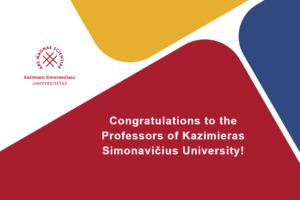
Last week the Rector of Kazimieras Simonavičius University, prof. dr. Arūnas Augustinaitis, and the University Senate awarded the pedagogical title of Professor in the field of social sciences to the following researchers for their scientific and pedagogical achievements:
Congratulations to the new Professors of Kazimieras Simonavičius University!
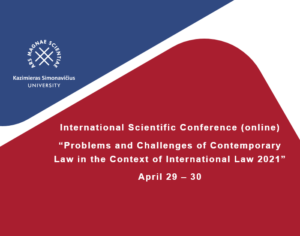
We invite you to participate in the international conference “Problems and Challenges of Contemporary Law in the Context of International Law 2021” jointly organised by Faculty of Law, Kazimieras Simonavičius University and international partners of the University.
The conference will be held on 29-30 April, 2021.
During these challenging times, in the context of major geopolitical changes, there is a need to review the legal structure, functioning of the conceptual order and to explore the possibility of creating new norms, tools, and paradigms.
The conference will provide an opportunity to critically and creatively address all areas of international law. Applications of innovative methods in solving emerging problems will be presented during the sessions of the event.
The aim of the conference is to promote the public scientific discussion of Lithuanian and world researchers, raising the problems and challenges of modern law in the contexts of international law, commercial, family, criminal, environmental, and other branches of law.
Participants: Lithuanian and foreign scientists – researchers, lecturers, students, law practitioners, and social partners.
Topics:
Business law;
International human rights;
Humanitarian law and criminal justice;
International disputes, arbitration, and dispute resolution;
International trade, investment, and finance;
International organisations;
Security, foreign relations and use of force;
Environment and sustainable development.
Conference program and time: 29 April.
Conference program and time: 30 April.
Here is a link to the conference on the 29th of April.
Join Zoom Meeting
https://us02web.zoom.us/j/89764111904
Here is a link to the conference on the 30th of April.
Join Zoom Meeting
https://us02web.zoom.us/j/85218401813
Language: The conference will be held in Lithuanian, English, and Russian.
Participation is free of charge.
Contact person
Olegas Beriozovas
Vice-Dean Of Law Faculty
E.mail: olegas.beriozovas@ksu.lt
Phone: +370 609 14472
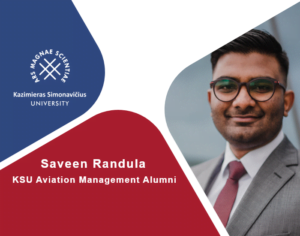
Saveen, could you tell us why did you decide to come to Lithuania? It is such a long way from Sri Lanka…
My study path has started once I successfully passed my exams in Sri Lanka and decided to move to China, as my family already lived there. I chose to study the Chinese language. After I graduated from Chinese studies, I started to search for a bachelor’s degree program to continue my studies in.
My interest in aviation most probably is related to my family’s background. My grandpa was an aircraft engineer and that is how I first got familiar with the aviation field, this interest to me came very naturally.
I was looking for Aviation Management studies in Europe. I found several programs and even got admitted. However, when I came across the KSU program, I compared the study subjects that were offered in KSU to other universities and realized that KSU is offering more relevant subjects. I was also happy to see that living conditions, housing costs in Lithuania are suitable for me. An educational system is well developed and it is considerably cheaper than in most of the other European countries, which is always important for a student.
Have you faced any cultural differences, what surprised you the most while living and studying in Lithuania?
Yes, the culture is indeed very different. I came to Lithuania from a country that is closely connected to the Buddhism religion, and that is one of the main cultural differences. It was easier for me to adapt here as I already had some international experience from the time I studied in China, where I spent a lot of time communicating with European students at University where we had an international students community which consisted of almost 2000 people. For me, coming to Lithuania was not problematic. However, at first, it was a bit cold for me here, I must admit.
Let’s talk about your choice to study Aviation Management. Did the course meet your expectations?
Yes, completely. I had high expectations and carefully chose a university to study in. I am very happy about my choice! I especially enjoyed the fact that in KSU I had a lot of international professors, also, we were studying in small groups and each student got a great amount of individual attention. Lecturers were truly experts in their fields. I still keep in touch with some of them. They are very nice people, always happy to help.
What did you like the most or did not like during your study period?
I honestly don’t have any dislikes. I felt that Lithuania is an open-minded country, you don’t feel any rush in here, lifestyle is not busy, you always feel surrounded by beautiful, very green nature full of trees everywhere. I even enjoyed winter, I find it quite special, as I come from a tropical country. However, the rainy weather in the spring and autumn seasons is not always a pleasure.
What is the biggest difference between studying in Lithuania and Sri Lanka?
The similarity is that in Sri Lanka, as a former British colony, we have high quality, well-developed educational system too. Universities in Sri Lanka are usually very small and students are often under a lot of pressure during their studies. Also, a bachelor’s degree studies can easily take up to 5 years, which is a lot compared to the 3.5 years that took me to complete my bachelor’s degree at KSU. It is a huge advantage. This might indicate that education in Lithuania is organized better. Also, here you are more likely to get an international study experience, meeting students and professors from various countries.
Why did you decide to stay in Lithuania after graduation? Please share your future career plans.
I decided to stay here because I wanted to continue my education and chose to study in a master’s program, also at KSU. I am currently looking for companies to apply for a full-time job after my studies. I am currently in a part-time aviation-related internship, getting more hands-on experience. I chose to study Organizational Innovation and Management master’s program, to get an even deeper understanding of the business operation and management.
If you had a chance to choose again, would you change anything in your choices?
I truly enjoy the sense of freedom and safety I feel in Lithuania. No air pollution, no rush, no traffic. I have lots of friends here, not only in the university but also in international student communities, which are very active in Lithuania. Therefore, I would not change anything about my choices.
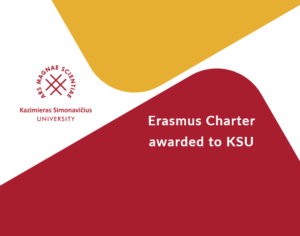
European Commission has awarded Erasmus Charter to Kazimieras Simonavičius University for a new Erasmus+ programme period (2021-2027). We welcome the opportunities offered by this charter to participate in academic exchanges of Erasmus students and teachers, as well as in international projects that develop various intellectual outputs, exchange good practices and strengthen cooperation with foreign universities.
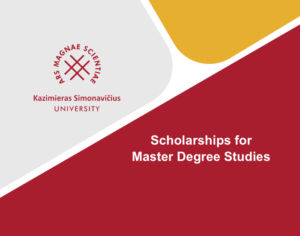
Education Exchanges Support Foundation is opening a Call for applications for 70 Lithuanian state scholarships for full-time Master’s degree or integrated studies (a part which is equal to Master’s degree studies) at Lithuanian higher education institutions for the year 2021. Funding under the Call will be provided to the citizens of Armenia, Azerbaijan, Belarus, China, Georgia, Israel, Japan, South Korea, Moldova Ukraine and foreigners of Lithuanian origin from non-EU and EFTA countries:
• A monthly scholarship and a grant covering the study cost is offered to citizens of:
Ukraine (30 grants);
Belarus (20 grants);
Armenia, Azerbaijan, Georgia, foreign citizens of Lithuanian origin, Moldova, (15 grants altogether);
• A monthly scholarship is offered to citizens of China, Israel, Japan, South Korea (5 grants altogether).
More information: https://bit.ly/3rFCrOA
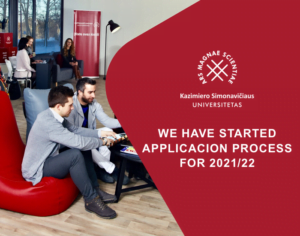
The early admission to undergraduate and graduate programmes at Kazimieras Simonavicius university has started. The sooner you apply, the faster we can give you an admission decision. So get started right away! Before you begin your application, please select the study programme:
Bachelor studies:
Master studies:
If you have any questions please do not hesitate to contact us by e-mail: admission@ksu.lt

This week, a new lecturer, Simonas Bartkus, will join the team of lecturers of the Aviation Management study program at the Kazimieras Simonavičius University Business School, who will teach a subject related to commercial aviation activities.
Mr. Simonas Bartkus is an airline industry professional with 12+ years of experience in airlines, airports, and consulting businesses. He served as Marketing Department Director for Small Planet Airline, Chief Commercial Officer for Lithuanian start-up carrier Air Lituanica and for Vilnius International Airport.
Areas of expertise:
“We are glad and proud that the team of lecturers in Aviation Management study program at Kazimieras Simonavičius University is growing every semester with excellent, and well-known not only foreign but also Lithuanian aviation experts. This allows ensuring the exceptional quality of the modules taught in the study program and at the same time to raise the ranks of the aviation community”. said Deimantė Žilinskienė, Director of KSU Business School.
 The International Compliance Association (ICA), the leading professional body for the global regulatory and financial crime compliance community, has partnered with the Kazimieras Simonavičius University (KSU) in Lithuania to offer ICA’s full suite of professional qualifications, including courses in anti money laundering (AML), financial crime prevention, and customer due diligence among others.
The International Compliance Association (ICA), the leading professional body for the global regulatory and financial crime compliance community, has partnered with the Kazimieras Simonavičius University (KSU) in Lithuania to offer ICA’s full suite of professional qualifications, including courses in anti money laundering (AML), financial crime prevention, and customer due diligence among others.
Lithuania was one of the countries at the centre of the Nordic banks’ money laundering case1, and has recently embarked on an effort to raise AML standards, including plans to establish an anti money laundering competence center supported by the Central Bank of Lithuania and commercial banks. The ICA-KSU partnership arrives just at the right time, helping to reinforce government efforts to combat money laundering and raise compliance standards in line with global best practice.
Undertaken by over 150,000 professionals globally, ICA qualifications are designed to equip industry professionals with the knowledge, skills and behaviour they need to mitigate and detect financial crime risk more effectively, combining global best practice, case studies, and practical skills. This new partnership will allow compliance and AML professionals at all levels in Lithuania to join this growing community of changemakers.
 ICA President Bill Howarth commented: ‘We’re pleased to partner with KSU and combine ICA’s nearly two decades of experience delivering high quality compliance and financial crime prevention education globally with KSU’s established reputation in the region, great professionalism and strong commitment to innovation and excellence. I look forward to working closely together to develop best practice risk managementand equip individuals, government institutions and firms with the right knowledge and skills they need to combat financial crime in Lithuania.’
ICA President Bill Howarth commented: ‘We’re pleased to partner with KSU and combine ICA’s nearly two decades of experience delivering high quality compliance and financial crime prevention education globally with KSU’s established reputation in the region, great professionalism and strong commitment to innovation and excellence. I look forward to working closely together to develop best practice risk managementand equip individuals, government institutions and firms with the right knowledge and skills they need to combat financial crime in Lithuania.’
KSU Chancellor Darius Verbyla commented: ‘With ever-tightening compliance, and in particular anti-money laundering regulations, and changing attitudes towards these crimes, many companies must constantly train and retrain their staff. We are very pleased to be able to provide much-needed compliance training of the highest quality to the Lithuanian financial sector in cooperation with ICA. KSU will offer all range of ICA courses, from introductory level to diploma level courses on anti-money laundering (AML), financial crime prevention, governance, risk and compliance topics so there is something for everyone.
To view the full suite of qualifications, visit: https://www.int-comp.org/course-finder/
About the International Compliance Association
The International Compliance Association is the leading professional body for the global regulatory and financial crime compliance community. Since 2001, it has enhanced the knowledge, skills and behaviour of over 150,000 professionals all over the world either through their internationally-recognised portfolio of professional qualifications (awarded in association with Alliance Manchester Business School, the University of Manchester) or through accredited in-company training.
For more information visit: www.int-comp.org